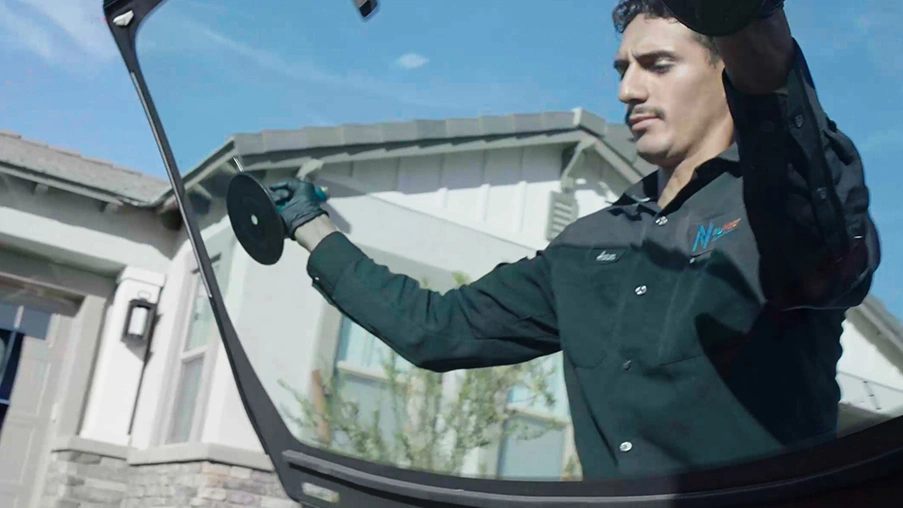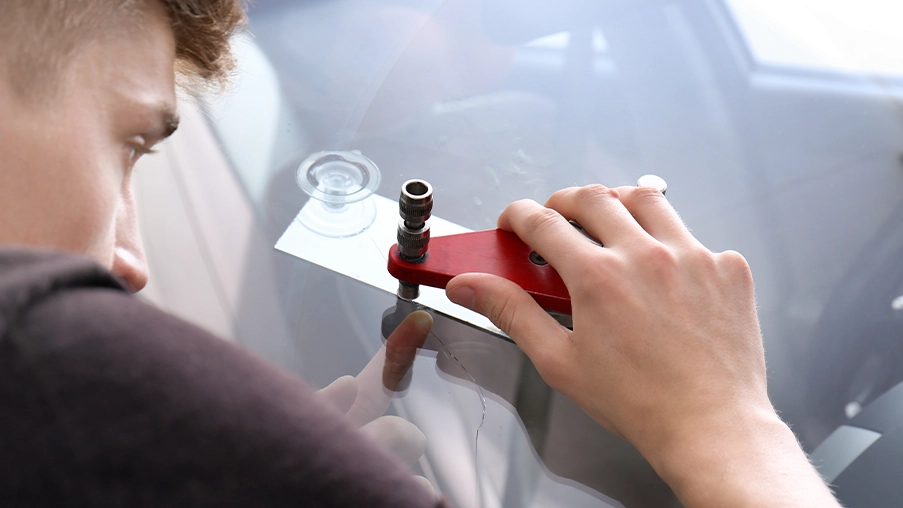Full-Glass Coverage: All You Need to Know
February 12, 2025
As a car owner, the last thing you’d want is a rock or a tree branch damaging your windshield. In such a situation, auto glass repair & replacement services could cost hundreds of dollars, regardless of whether the defect remains as a chip or develops into a crack that runs across your windshield.
In such emergencies, auto insurance coverage becomes crucial to get your windshield repaired or replaced without burning a hole in your pockets. Full-glass coverage auto insurance comes in handy in such situations.
In this blog, we’ll look at its pros and cons to help you decide if it’s worth purchasing.
What is Full Glass Coverage?
Usually, there are comprehensive auto insurance policies in most states that do not completely cover all your damage costs unless you pay a deductible (an amount you pay before the insurance company pays for covered expenses).
Example: As part of your comprehensive coverage, you have a $400 deductible amount, and the repair or replacement expenses are $250. The insurance company will not shell out a single penny since the deductible or threshold amount has not been met. You shall have to pay for the entire expenses.
Full glass coverage is a type of auto glass protection that allows you to have your windshield, or any other glass fixed without having to pay a deductible. It is an add-on premium to your comprehensive coverage.
Pros of Full Glass Coverage
Prior to purchasing insurance, it is crucial to understand the benefits of the policy. Let’s find out.
1. Financial Cushion
Although Florida’s Statute 627.728 mandates the settlement of windshield repair & replacement claims with a zero-deductible, this coverage is limited to windshields only. Full glass coverage extends to other glasses, such as rear and side windows, sunroofs, quarter glass, and vent glass, and hence provides complete financial protection.
2. Peace of Mind
It ensures peace of mind. You won’t have to worry about exorbitant out-of-pocket expenses in case of a damaged glass anywhere on your car.
3. Faster Claim Settlement
With zero out-of-pocket deductibles, you could expect faster settlement of insurance claims, thus translating to quicker repair or replacement. In this way, you’ll be able to maintain safety standards.
Cons of Full Glass Coverage
Despite providing 360-degree coverage, it has its share of disadvantages. Let’s look at them.
1. Additional Financial Burden
It is an add-on or rider that demands extra premiums. Even if the monthly cost seems small, these could accumulate over time.
2. Not Always Required
If you drive less or have a low deductible on your base insurance policy, paying more premiums might not be worth it.
3. Limited Coverage
Although it covers all types of glass damage, there could be a cap on the number of claims to be paid in a year or on the total claim amount. Some insurance companies might also have sub-limits based on the part being repaired or replaced.
Now that you’ve understood the pros and cons of full glass coverage, it is important to know whether you really require it or it is just an additional burden on your pockets.
Is Full Glass Coverage Right for You?
You might choose to include glass coverage in your auto insurance based on several variables, like your budget, the cost involved, and the possibility of requiring glass replacements or repairs.
To find out if full glass coverage is appropriate for you, ask yourself these questions:
- Driving patterns: Do you frequently travel on highways, uneven roads, or roads under construction? If yes, then only opting for it is worth the price.
- Type of vehicle: Do you drive a high-end car with expensive spare parts or one with an advanced windshield that requires ADAS calibration?
- Cost: What is the deductible amount for your comprehensive coverage? If there is a large deductible, then purchasing full coverage makes sense.
- Location: Do you live in a region frequented by adverse weather conditions such as hailstorms, hurricanes, etc.? If so, you could invest in a full-coverage policy.
Alternatives to Full Glass Coverage
Although full glass coverage provides all-round protection, there are scenarios when not availing it might make more sense. In such cases, paying for only the cover you need becomes a wiser approach. Let’s find out how.
- Collision coverage: This covers auto glass repair claims where the damage has been caused by an accidental collision between two vehicles or with stationary objects like rocks, guardrails, dividers, etc.
- Comprehensive coverage: This covers damage caused by non-collision incidents like fire, theft and vandalism, adverse weather, animals, etc.
- Out-of-pocket coverage: If you’re a low-risk driver who drives very occasionally, you might consider paying for repairs out-of-pocket since that would be more cost-effective.
Conclusion
Purchasing full glass coverage auto insurance could be a wise investment since it offers financial security and peace of mind against unforeseen windshield damage or even side window repair & replacement.
This purchase, however, might put a strain on your insurance budget by raising your premium. Therefore, you must consider the advantages and disadvantages carefully to determine if it is the best option for you.
If you’ve purchased such a policy and encounter a damaged glass, don’t worry. Contact NuVision Auto Glass to enjoy same-day, hassle-free mobile windshield replacement service at your preferred location from our expert technicians. That, too, without paying a single penny from your pockets.
FAQs
1. Should you get full glass coverage?
You might consider it if you drive a lot, have a high deductible, or drive a car with expensive glass parts.
2. What are the pros and cons of glass coverage?
Here are some of the pros and cons of glass coverage:
- Pros: Complete coverage for all auto glass repair or replacement with no deductible.
- Cons: Extra monthly expense; if your risk profile is low-to-moderate, it might not be required.
3. What does safety glass full coverage mean?
Safety glass full coverage refers to complete glass protection that covers the repair or replacement of your car’s safety glass components, such as the windshield, side windows, and rear window, without a deductible.
4. How much does full glass coverage typically cost in Florida?
Your insurance company, car, and driving record could all affect how much it costs. In general, you need an extra $5 to $30 per year on top of your base insurance premium.




